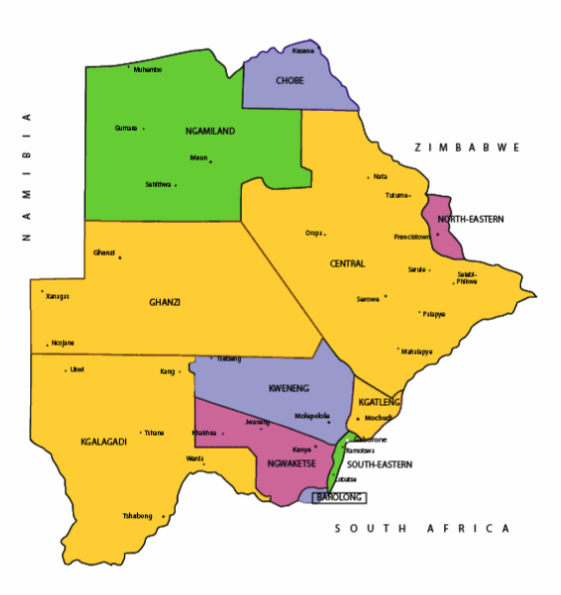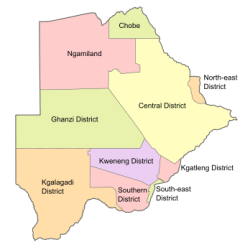Places and their polling stations in Palapye, Botswana
161 Mmalekokopu
0791 Khurumela Kgotla
0792 Khurumela Primary School
0793 Open Space Next To Martha’s Fields
0794 Biust
0795 Lemone Kgotla
0796 Makoro Gate
0797 Eloi Church
162 Khurumela
0798 Lotsane SSS
0799 Word of Life Christian Outreach
0800 Mabogo JSS
163 Morupule
0801 Bhc Offices
0802 Bhc Low Cost Volley Ball Grounds
0803 Standpipe 42
0804 Holly Christian Church In Zion
164 Mmaphula West
0805 Open Space Plot No. 1481 – Extension 3
0806 Soul Winning Church
0807 Open Space Plot No. 9347 – Extension 7
0808 Palapye Magistrate Court
165 Mmaphula East
0809 Extension 5 Kgotla
0810 Dikabeya Mobile Health Post
0811 Sebeso Primary School
0812 Open Space Next To Morupule Houses – Extension 8
0813 Assemblies of God
0814 Extension 1 Kgotla
0815 Extension 10
166 Boikago-Madiba
0816 Madiba Kgotla
0817 UCCSA Church
0818 Fire Aglo Prayer Ministry
0819 Kgolagano Education Centre
0820 Holy Bontle Apostolic Church In Zion
167 Mmaphula Central
0821 Morwalela Primary School
0822 Open Space No. 1617 (Multi-Purpose Plot) – Extension 3
0823 Vtc Hostels
0824 Ratsie Setlhako Primary School
168 Serorome East
0825 St. John Church
0826 Palapye Main Kgotla
0827 Bethlehem Faith Mission Church
0828 Ditlhomeso Standpipe
0829 Open Space Next To Sedudu Tuckshop
169 Serorome West
0830 Kediretswe Primary School
0831 Standpipe 50
0832 Dht Offices
0833 Serorome Primary School
0834 Open Space Next To Da Houses (Behind The Secret Place Lodge)
170 Lotsane-Thomadithotse
0835 Old Thomadithotse Kgotla
0836 Thomadithotse Kgotla
0837 Ntlo Ya Efangele
0838 Boipuso Primary School
0839 Lotsane Kgotla
Reference: iec.gov.bw/index.php/electoral-districts/polling-stations.html
Botswana
Botswana is a country in Africa. It is topographically flat, with approximately 70 percent of its territory being the Kalahari Desert.
It is bordered by South Africa to the south and southeast, Namibia to the west and north, and Zimbabwe to the northeast.
Capital: Gaborone
Currency: Botswanan Pula
Official language: English
Population: 2.588 million (2021) World Bank
Dialing code: +267
Gross Domestic Product: 17.61 billion USD (2021) World Bank
Botswana’s ten districts are:
- Southern District
- South-East District
- Kweneng District
- Kgatleng District
- Central District
- North-East District
- Ngamiland District
- Kgalagadi District
- Chobe District
- Ghanzi District
Botswana’s councils created from urban or town councils are: Gaborone City, Francistown, Lobatse Town, Selebi-Phikwe Town, Jwaneng Town, Orapa Town and Sowa Township.






The name Botswana refers to ‘Land of the Tswana’. The landlocked, Southern Africa country is officially known as the Republic of Botswana.














Botswana is connected to Zambia through the Kazungula Bridge making it the world’s shortest border between two countries.
A country of slightly over 2 million people (2021), Botswana is one of the most sparsely populated countries in the world. It is essentially the nation state of the Tswana ethnic group, who make up 79% of the population.

About 11.6 per cent of the population lives in the capital and largest city, Gaborone.
Formerly one of the world’s poorest countries—with a GDP per capita of about US$70 per year in the late 1960s—it has since transformed itself into an upper-middle-income country, with one of the world’s fastest-growing economies.


The Tswana ethnic group were descended mainly from Bantu-speaking tribes who migrated southward of Africa to modern Botswana, living in tribal enclaves as farmers and herders.




In 1885, the British colonised the area and declared a protectorate under the name of Bechuanaland.
As colonisation stopped, Bechuanaland became an independent republic under its current name on 30 September 1966.


Since then, it has been a representative republic, with a consistent record of uninterrupted democratic elections and the lowest perceived corruption ranking in Africa since at least 1998.

The economy is dominated by mining and tourism. Botswana has a GDP (purchasing power parity) per capita of about $18,113 as of 2021, one of the highest in subsaharan Africa.


Botswana is the world’s biggest diamond producing country.
Its relatively high gross national income per capita gives the country a high standard of living and the third-highest Human Development Index of continental Sub-Saharan Africa (after Gabon and South Africa).
The country has been adversely affected by the HIV/AIDS epidemic. In 2002, Botswana began offering anti-retroviral drugs (ARVs) to help combat the epidemic.
Botswana is a member of the Southern African Customs Union, the Southern African Development Community, the Commonwealth of Nations, and the United Nations.

